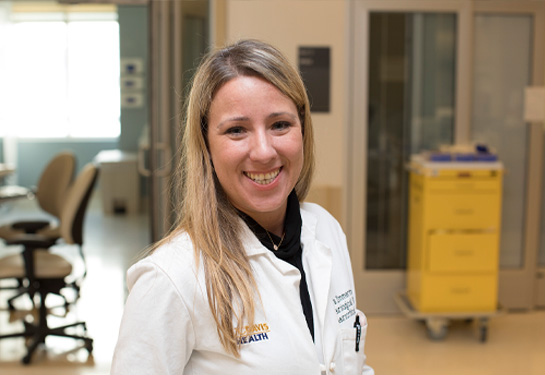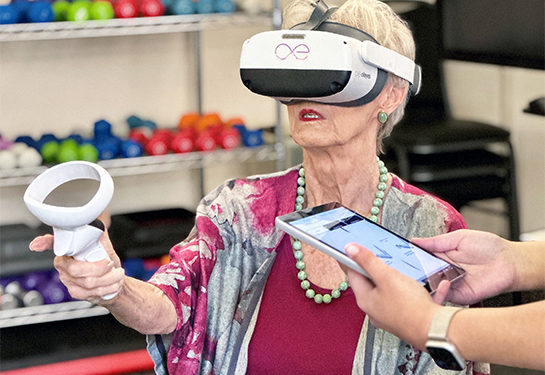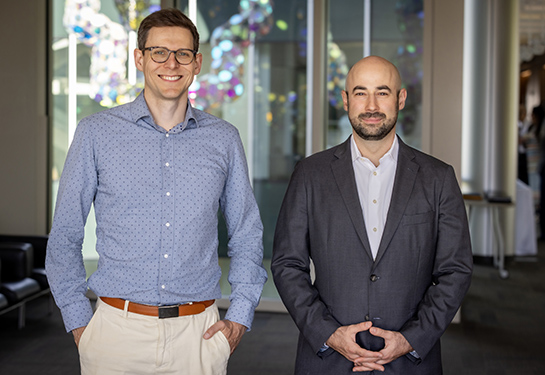Researchers hope to study protein as an intervention for stroke patients
UC Davis Health researchers hope to learn whether giving stroke patients a synthetic protein can improve their recovery.
Our body produces the protein Factor VIIa to help stop bleeding at the site of a blood vessel injury. The researchers are studying a medication intervention that involves administering the synthetic version of the same protein but in a much larger dose than the body usually makes. This high dose, known as recombinant Factor VIIa (rFVIIa), will be delivered to eligible participants who are experiencing intracerebral hemorrhage, a type of stroke that causes bleeding in the brain.
The study involves UC Davis Health’s Departments of Neurology and Neurosurgery. It is a collaboration with over 100 hospitals and mobile stroke units around the world known as the FVIIa for Acute Hemorrhagic Stroke Administered at Earliest Time (FASTEST) trial.
Researchers want to determine if giving stroke patients the protein will slow bleeding in the brain and improve a stroke patient’s outcome within 180 days. The National Institutes of Health is sponsoring the trial.
“Factor VIIa is safe and stops bleeding in the brain. It holds promise to improve neurological outcomes after a stroke caused by an intracerebral hemorrhage,” said lead researcher Lara Zimmermann, a UC Davis Health neurologist. “When given within two hours of a stroke, it may prevent a patient’s symptoms from worsening.”
This synthetic protein has been approved to stop bleeding in other parts of the body, but not yet specifically for the brain.
Potential Benefits
There is no scientifically proven treatment for bleeding in the brain. Due to the rapid pace of such bleeding, patients who come to the emergency department at the UC Davis Medical Center with stroke symptoms may be enrolled in the FASTEST study quickly. Participants will randomly receive either rFVIIa administered intravenously over two minutes, or a placebo.
Regardless of which intervention they get, all participants will receive standard medical care, including close management of blood pressure and care within the Intensive Care Unit.
‘Time is brain’
Bleeding in the brain happens very rapidly and can be fatal. Over 40% of patients die, and only 20% of survivors can care for themselves.
“With strokes, time is brain. Strokes can affect an individual’s ability to understand, communicate and make decisions about their medical treatment,” said Zimmermann, a neuro intensivist and director of neurocritical care at UC Davis Health. “As a premier academic medical center in the Sacramento region, it is important that we offer each patient leading-edge treatment options that may improve their outcome. That includes access to clinical trials.”
Due to the severity of brain injury in stroke patients, most patients eligible for the FASTEST study may be unable to consent or decline participation. Federal government rules allow studies to include patients with an “exception from informed consent” under emergency circumstances. This is only permitted in life-threatening circumstances, including when:
- The best treatment strategy is unknown
- There is a potential benefit to participants
- It is not possible to get consent from the patients’ families or representatives before the study strategies must begin
Opting Out
If a future patient does not wish to be enrolled in the FASTEST study, they can proactively decline participation. In such a case, it is important to carry an "opt-out card" throughout the study enrollment period, which concludes in late 2024. If a patient ever goes to UC Davis Medical Center with stroke symptoms, the emergency teams and hospital staff will check for this card, and the researchers will be informed not to enroll the person in the study.
To opt out, please contact the study team or visit the study page for more detailed information. You should also inform your family of your decision.
The study team can also be reached by email or phone: 916-703-2045.
Funded by NIH, grant number: 1U01NS110772-01




